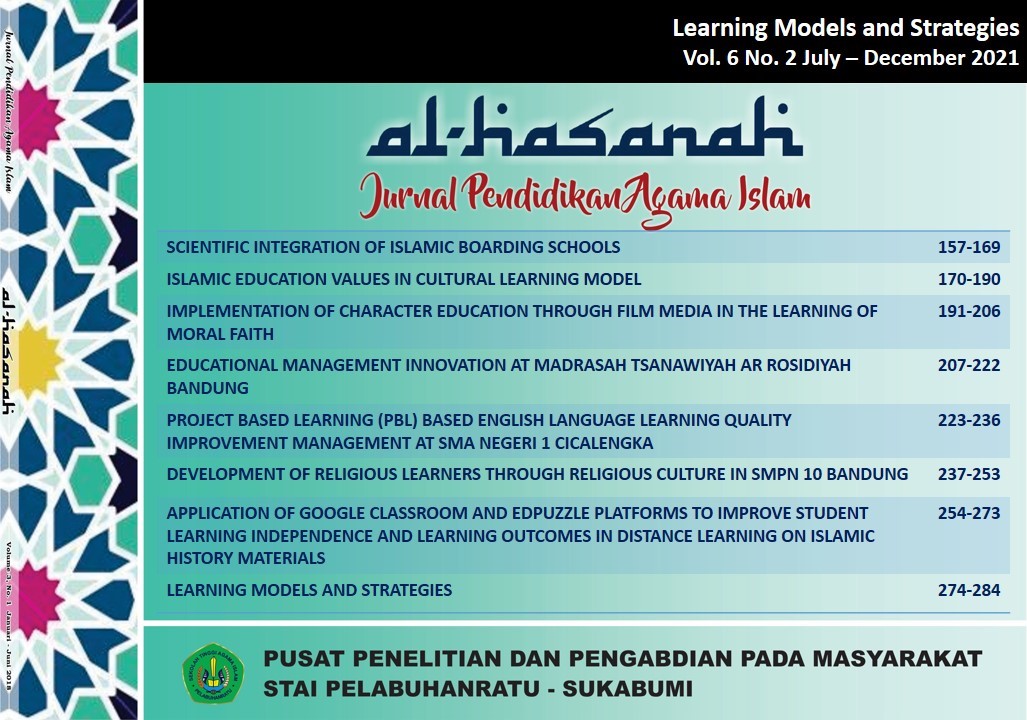NILAI-NILAI PENDIDIKAN ISLAM DALAM MODEL PEMBELAJARAN BUDAYA
DOI:
https://doi.org/10.51729/6238Keywords:
Building, Religious Education, Local WisdomAbstract
This study aims to determine the value of Bugis culture in Islamic education at Tana Luwu higher education institutions in Palopo City, namely Andi Djemma University, IAIN Palopo. This study uses a qualitative method with an ethnopedagogical approach. Building religious harmony in the value of local wisdom education is still very relevant to be applied by all students. This is reflected in the attitude of students through discipline and responsibility. Discipline and responsibility of students to maintain self-esteem, dignity. A reflection of plurality which functions as a student's spirit in the process of values education. The concept of cultural learning in Islamic religious education provides respect for values such as Sipakatau (giving each other information), Sipakalebbi (Mutual respect), Sipakingge (Reminding each other), Sipakatou (Sharing each other). Appreciate peace, happy to help others, especially if they are fellow human beings. So that Bugis cultural education is in line with the plurality values that grow and develop in Indonesia
Downloads
References
Abdullah, S. (2016). Kajian Rekonstruksi “Budaya Siri” Bugis Ditinjau Dari Pendidikan Islam. AL-ISHLAH: Jurnal Pendidikan Islam, 14(2).
Astuti, H. J. P. (2018). ISLAM NUSANTARA: SEBUAH ARGUMENTASI BERAGAMA DALAM BINGKAI KULTURAL. INJECT (Interdisciplinary Journal of Communication), 2(1), 27. https://doi.org/10.18326/inject.v2i1.27-52
Dalle, M., & Jundi, M. (2021). Sosio-Politik Orang Bugis dan Islamisasi Masyarakat Sulawesi Timur di Zaman Kolonialisasi Belanda. HEURISTIK: Jurnal Pendidikan Sejarah, 1(2), 90–106. https://doi.org/https://doi.org/10.31258/hjps.1.2.90-106
Fita Mustafida. (2020). Integrasi Nilai-nilai Multikultural dalam Pembelajaran Pendidikan Agama Islam (PAI). Jurnal Pendidikan Islam Indonesia, 4(2), 173–185. https://doi.org/10.35316/jpii.v4i2.191
Hadi, S., & Bayu, Y. (2021). Membangun Kerukunan Umat Beragama melalui Model Pembelajaran PAI Berbasis Kearifan Lokal pada Penguruan Tinggi. Tarbiyah Wa Ta’lim: Jurnal Penelitian Pendidikan Dan Pembelajaran, 8(1), 23–36. https://doi.org/https://doi.org/10.21093/twt.v8i1.3111
Hamid, A. (2006). Semangat Islam Dalam Kebudayaan Orang Bugis-Makassar. Jurnal Jaffray, 4(1), 16. https://doi.org/10.25278/jj71.v4i1.129
Ismail Suwardi Wekke, Arhanuddin Salim, Yunus Salik. (2018). PENDIDIKAN KARAKTER DALAM MASYARAKAT BUGIS. Ijtimaiyya: Jurnal Pengembangan Masyarakat Islam, 11(1), 41–62. https://doi.org/10.24042/ijpmi.v11i1.3415
Lindayanti, L., & Zaiyardam, Z. (2016). KONFLIK DAN INTEGRASI DALAM MASYARAKAT PLURAL: JAMBI 1970-2012. Paramita: Historical Studies Journal, 25(2), 169. https://doi.org/10.15294/paramita.v25i2.5129
Norris, P. (2003). Preaching to the Converted? Party Politics, 9(1), 21–45. https://doi.org/10.1177/135406880391003
Salik, Y. (2020). Model Pendidikan Budaya Bugis dalam Penerapan Nilai-nilai Pluralisme di IAIN Palopo. JURNAL PENELITIAN, 14(2), 217. https://doi.org/10.21043/jp.v14i2.8251
Yunus, Y. (2020a). SOSIAL-BUDAYA: HARMONISASI AGAMA DAN BUDAYA DALAM PENDIDIKAN TOLERANSI. Kalam: Jurnal Agama Dan Sosial Humaniora, 8(2), 1–26.
Yunus, Y. (2020b). MODEL TUDANG SIPULUNG DALAM PEMBELAJARAN ISLAM DAN KEARIFAN LOKAL. MANAGERE : Indonesian Journal of Educational Management, 2(3), 293–308. https://doi.org/10.52627/ijeam.v2i3.45
Yusuf, M. (2012). Bahasa Bugis dan Penulisan Tafsir di Sulawesi Selatan. Al-Ulum, 12(1), 77–96.
Zafi, A. A. (2017). TRANSFORMASI BUDAYA MELALUI LEMBAGA PENDIDIKAN. SOSIOHUMANIORA: Jurnal Ilmiah Ilmu Sosial Dan Humaniora, 3(2), 1–16. https://doi.org/10.30738/sosio.v3i2.937

Additional Files
Published
How to Cite
Issue
Section
License

This work is licensed under a Creative Commons Attribution-ShareAlike 4.0 International License.
Authors who publish with this journal agree to the following terms:
- Authors retain copyright and grant the journal right of first publication with the work simultaneously licensed under a Creative Commons Attribution 4.0 International License. that allows others to share the work with an acknowledgement of the work's authorship and initial publication in this journal.
- Authors are able to enter into separate, additional contractual arrangements for the non-exclusive distribution of the journal's published version of the work (e.g., post it to an institutional repository or publish it in a book), with an acknowledgement of its initial publication in this journal.
- Authors are permitted and encouraged to post their work online (e.g., in institutional repositories or on their website) prior to and during the submission process, as it can lead to productive exchanges, as well as earlier and greater citation of published work.
















